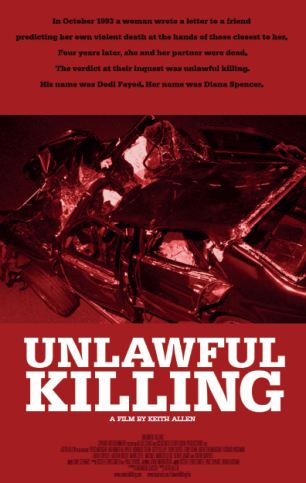Unlawful Killing – the Princess Diana conspiracy film
Dir: Keith Allen
The phrase “banned in the UK” still has a curious lure to me, even though I haven’t lived there now for over 13 years. So, hearing about this documentary immediately piqued my interest, since it was more or less damned as far as any UK release was concerned – lawyers apparently advised the lawyers that 87 different cuts would need to be made, mostly for reasons of libel. Any US release was similarly shelved after it was was deemed impossible to secure insurance against the possibility of legal repercussions. There are reasons to be skeptical of the film, not least that it’s entire budget of $2.5 million was apparently provided by Mohammed Al Fayed, the father of Dodi, and someone who, it’s safe to say, has something of a prejudiced agenda in the case. Virtually since Day One, he has been banging the drum that the British establishment murdered his son and Diana, because they couldn’t stand the prospect of a Muslim being a step-father to the future King – and, hey, what are the odds, the film comes to exactly the same conclusions, both general and specific.
It’s hugely variable stuff. Some of the claims made in the film are basically ludicrous: such as the one that the entire legal system is “corrupt,” because they all swear allegiance to the Crown. Presumably, that would therefore include the likes of Michael Mansfield, QC to Al Fayed. There’s also no mention of Diana’s previous relationship with Hasnat Khan, another Muslim, which lasted two years and apparently met with little or no opposition from the palace. In contrast, Diana had first met Dodi less than seven weeks before her death, and had probably spent little more than three weeks together, so the claim they were intending to get married seems difficult to sustain. The same goes for the allegation she was pregnant: while the swift embalming of her body would indeed have made it harder to tell if that was the case, all the circumstantial evidence seems to suggest otherwise.
On the other hand, there are items about the affair which still make me go “Hmmm.” Like the way there was absolutely no CCTV footage available anywhere on the route. Or the letter Diana wrote, saying “My husband is planning ‘an accident’ in my car, brake failure and serious head injury in order to make the path clear for Charles to marry.” Considering what happened subsequently, it is valid to ask why Prince Charles – nor, indeed, any of the royal family, and just about none of their household – was not called to testify at the lengthy inquest into Diana’s death, held in 2007-08. Then there’s the mysterious white Fiat Uno which appears to have hit Diana’s Mercedes and vanished. The film suggests this belonged to French photojournalist James Andanson, who was found, burned to death inside a locked car in May 2000 – with the keys nowhere to be found. The verdict: “suicide”. As I say: hmmm.
The problem is that, if you do the slightest digging into the claims, the film is so one-sided as to be little more than Al Fayed propaganda, despite Allen’s protestations to the contrary. The problem is that the blatant and obvious bias will, in fact, tend to push the undecided away; a more measured approach, acknowledging the weaknesses and providing both sides of the argument, before coming to a conclusion, is more likely to encourage open-mindedness. Truth be told, it probably works better as a satire of press incompetence, though I’m not sure we really need a dramatic reconstruction of BBC Royal Correspondent, Nicholas Witchell, falling asleep in a tent, amusing though it is. There’s also a strong republican (small r, note) bent, with allegations that Prince Philip is a clinical psychopath. I’m not quite sure what exactly that all has to do with a car-crash in Paris, and it seems to have strayed in from an entirely separate – possibly more interesting – documentary.
This is truly about as far from impartial as it’s possible to get. That doesn’t, in itself, make it a bad documentary, but the best example of the genre, for me, are those which follow the facts wherever they may lead, rather than starting with a conclusion, then highlighting only the facts to be found on the path to the conclusion. The real takeaways here, are, tabloid journalists are lazy, and the Royal Family don’t like having their dirty washing aired in public – neither should come as a particular surprise. Don’t mistake this for definitive, or anything approaching it, and instead you’d be best of to treat it as a scurrilous feature-length special edition of Hello!

